大学英语教学指南
大学英语教学指南202
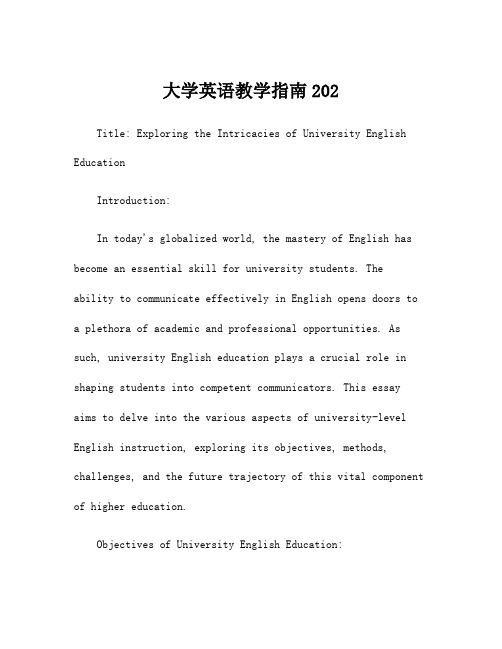
大学英语教学指南202Title: Exploring the Intricacies of University English EducationIntroduction:In today's globalized world, the mastery of English has become an essential skill for university students. Theability to communicate effectively in English opens doors to a plethora of academic and professional opportunities. As such, university English education plays a crucial role in shaping students into competent communicators. This essay aims to delve into the various aspects of university-level English instruction, exploring its objectives, methods, challenges, and the future trajectory of this vital component of higher education.Objectives of University English Education:The primary goal of university English teaching is to develop students’ proficiency in all four language skills: reading, writing, listening, and speaking. These skills are interwoven, and a solid foundation in each is necessary for effective communication. Reading enables students to access a vast array of academic materials and to comprehend diverse viewpoints. Writing allows them to articulate their ideas clearly and logically. Listening fosters understanding and empathy towards others' perspectives, while speaking enables active participation in discussions and presentations.Teaching Methods:University English courses often employ a variety of teaching methods to cater to different learning styles. One popular approach is the communicative method, which emphasizes the practical use of English through engaging activities that simulate real-life scenarios. Additionally, task-based learning focuses on completing specific tasks thatrequire the use of English, thereby reinforcing language acquisition through practice. Integrated skills classes challenge students to use multiple language skills simultaneously, enhancing their overall proficiency. Furthermore, technology-enhanced learning, including online platforms and educational software, provides students with interactive and adaptable resources for language development.Challenges in University English Teaching:Despite the best efforts of educators, several challenges persist in university English instruction. One such challenge is the diversity of learner backgrounds, which can lead to varying levels of proficiency within the same class. To address this, instructors may employ differentiated instruction, tailoring activities to meet individual needs. Another challenge is maintaining student motivation, especially as the novelty of learning a new language wears off. Instructors can combat this by incorporating relevantand engaging content into their lessons, as well as by providing opportunities for students to use English creatively and collaboratively.Assessment Strategies:Assessment is a critical component of university English teaching, serving to monitor student progress and inform instructional decisions. Formative assessments, such as quizzes and peer reviews, provide ongoing feedback to both students and teachers. Summative assessments, like final exams or comprehensive essays, evaluate the cumulative learning outcomes. Performance-based assessments, including presentations and group projects, allow students to demonstrate their language abilities in practical contexts.Curriculum Development:Designing a comprehensive curriculum for university English courses involves careful consideration of course goals, content selection, and instructional strategies. Thecurriculum should align with the institutional objectives and reflect current trends in language teaching. It should also integrate multicultural perspectives, preparing students to interact with an increasingly diverse global community.Technology Integration:Technological advancements have significantly impacted university English teaching. Online platforms facilitate remote learning and offer a wealth of interactive resources, such as multimedia exercises and virtual simulations. Language learning apps can supplement classroom instruction, providing students with additional practice opportunities. Moreover, social media and digital communication tools enable authentic language use in virtual environments.Professional Development for Instructors:Maintaining high-quality university English education requires continuous professional development for instructors. This includes keeping abreast of recent research in languageacquisition, attending workshops and conferences, and engaging in peer collaboration. By staying current with educational innovations, instructors can enhance their teaching practices and better support their students' learning.International Perspectives:University English programs often incorporate international perspectives, recognizing the importance of global competencies in today's interconnected world. Study abroad programs, international student exchanges, and cross-cultural communication modules expand students' horizons and deepen their understanding of diverse societies and cultures.Conclusion:In conclusion, university English education is a dynamic and ever-evolving field that plays a pivotal role in preparing students for success in both academic and professional domains. Through a combination of effectiveteaching methods, responsive assessment strategies, and a commitment to continuous improvement, university English programs equip students with the linguistic and cultural competencies necessary for navigating a complex and interconnected world. As we move forward, it is essential to continue refining our approaches to teaching English at the university level, ensuring that they remain relevant, engaging, and effective in fostering globally minded communicators.。
大学英语教学指南(2020 版)

大学英语教学指南(2020 版)全文共3篇示例,供读者参考篇1Title: A Guide to College English Teaching (2020 Edition)IntroductionCollege English teaching plays a crucial role in students' overall education and career development. As we enter the year 2020, it is essential to update the teaching methods and materials to meet the changing needs of students. This guide aims to provide college English teachers with the latest strategies and resources to enhance their teaching effectiveness and help students achieve academic success.1. Setting Learning ObjectivesIt is essential to establish clear learning objectives for each lesson or course. These objectives should be specific, measurable, achievable, relevant, and time-bound. By clearly defining what students are expected to learn, teachers can guide their instruction effectively and help students stay focused on their learning goals.2. Incorporating TechnologyIn the digital age, technology has become an integral part of teaching and learning. College English teachers should explore various technological tools and resources to enhance their teaching, such as online learning platforms, interactive whiteboards, and multimedia resources. These tools can help engage students, increase their motivation, and provide personalized learning experiences.3. Implementing Active Learning StrategiesActive learning encourages students to learn through hands-on activities, group discussions, and collaborative projects. College English teachers should incorporate active learning strategies into their lessons to promote critical thinking, problem-solving skills, and communication abilities. Some effective active learning techniques include debates, role-playing exercises, and case studies.4. Assessing Student LearningAssessment is an integral part of the teaching and learning process. College English teachers should use a variety of assessment methods, such as quizzes, exams, essays, and projects, to evaluate students' understanding of the material. It isessential to provide timely feedback to students to help them improve their learning and performance.5. Promoting Cultural AwarenessIn a globalized world, it is crucial for students to develop cultural awareness and communication skills. College English teachers should incorporate diverse cultural perspectives into their curriculum and create opportunities for students to learn about different cultures and traditions. By promoting cultural awareness, teachers can help students become moreopen-minded and empathetic individuals.6. Providing Language SupportMany college English students may face challenges with language proficiency, especially those who are non-native speakers. College English teachers should provide language support to help students improve their reading, writing, speaking, and listening skills. This support can include vocabulary-building exercises, grammar drills, pronunciation practice, and language immersion activities.7. Encouraging Lifelong LearningCollege English teaching should not only focus on academic achievement but also on fostering a love for learning andintellectual curiosity. Teachers should inspire students to continue learning beyond the classroom and pursue lifelong learning opportunities. By encouraging a growth mindset and a passion for knowledge, teachers can help students become lifelong learners and successful individuals.ConclusionIn conclusion, the field of college English teaching is continually evolving, and it is essential for teachers to adapt to these changes to meet students' needs effectively. By following the guidelines outlined in this guide, college English teachers can enhance their teaching effectiveness, promote student success, and create a positive learning environment. Through continuous professional development and a commitment to excellence, teachers can inspire students to achieve their academic goals and prepare them for success in their future careers.篇2Title: A Guide to College English Teaching (2020 Edition)I. IntroductionThe college English teaching guide for 2020 aims to provide educators with comprehensive strategies and techniques to enhance the teaching and learning of English in higher education.This guide covers various aspects of English teaching, including curriculum design, teaching methodologies, assessment, and technology integration.II. Curriculum DesignThe curriculum design section of the guide emphasizes the importance of aligning learning objectives with students' needs and goals. Educators are encouraged to create engaging and relevant content that promotes language acquisition and cultural understanding. In addition, the guide suggests incorporating current events, real-world scenarios, and multimedia resources into the curriculum to enhance students' language skills and critical thinking abilities.III. Teaching MethodologiesEffective teaching methodologies are essential for engaging students and fostering language development. The guide encourages educators to use a variety of teaching strategies, such as communicative language teaching, project-based learning, and flipped classroom models. By incorporating interactive activities, group work, and multimedia resources into their lessons, educators can create a dynamic and engaging learning environment that promotes language acquisition and retention.IV. AssessmentAssessment plays a crucial role in measuring students' progress and understanding of course material. The guide recommends using a combination of formative and summative assessments to evaluate students' language proficiency. In addition, educators are encouraged to provide timely and constructive feedback to help students improve their language skills and reach their full potential.V. Technology IntegrationTechnology integration has transformed the way English is taught and learned in higher education. The guide highlights the importance of using digital tools, online resources, and multimedia platforms to enhance language instruction. Educators are encouraged to leverage technology to create interactive lessons, facilitate communication and collaboration, and provide personalized learning experiences for students.VI. ConclusionThe 2020 college English teaching guide provides educators with a comprehensive roadmap for enhancing the teaching and learning of English in higher education. By following the strategies and techniques outlined in this guide, educators cancreate dynamic and engaging learning experiences that promote language acquisition, critical thinking, and cultural understanding among students.篇3Title: A Guide to College English Teaching (2020 Edition)Introduction:College English teaching has always been a complex and dynamic field, constantly evolving to meet the changing needs of students and society. The 2020 edition of the College English Teaching Guide aims to provide instructors with updated strategies and resources to enhance the learning experience for students.1. Setting Learning ObjectivesOne of the key aspects of effective English teaching is setting clear and achievable learning objectives. Instructors should consider the level of proficiency of their students and tailor their objectives accordingly. For example, beginner students may focus on basic vocabulary and grammar, while advanced students may be challenged with more complex reading and writing tasks.2. Incorporating TechnologyIn today's digital age, technology can be a valuable tool for teaching English. Instructors can use online resources, such as language learning apps and websites, to supplement classroom instruction. Additionally, video conferencing platforms can be used to facilitate remote learning, allowing students to participate in English classes from anywhere in the world.3. Promoting Active LearningActive learning is essential for student engagement and retention of information. Instructors should incorporate a variety of teaching methods, such as group discussions, role-playing exercises, and project-based learning, to keep students actively involved in the learning process. Providing opportunities for students to apply their English language skills in real-world contexts can also enhance their learning experience.4. Providing FeedbackFeedback is an important aspect of the learning process, as it helps students understand their strengths and weaknesses. Instructors should provide timely and constructive feedback on students' assignments and activities, highlighting areas for improvement and offering guidance on how to strengthen theirEnglish language skills. Encouraging students to reflect on their own learning and set goals for improvement can also be beneficial.5. Cultivating Language SkillsIn addition to teaching grammar and vocabulary, instructors should focus on developing students' language skills, including speaking, listening, reading, and writing. Providing opportunities for students to practice their English language skills in a variety of contexts, such as debates, presentations, and creative writing exercises, can help them become more confident and proficient English speakers.Conclusion:The 2020 edition of the College English Teaching Guide provides instructors with updated strategies and resources to enhance the learning experience for students. By setting clear learning objectives, incorporating technology, promoting active learning, providing feedback, and cultivating language skills, instructors can create a dynamic and engaging learning environment that fosters student success in English language learning.。
完整版大学英语教学指南教育部2017版

大学英语教学指南(教育部2017最新版)1 前言为了全面贯彻党的教育方针,进一步深化大学英语教学改革,提高教学质量,根据《国家中长期教育改革和发展规划纲要(2010-2020年)》和教育部《关于全面提高高等教育质量的若干意见》等文件的精神,在总结大学英语课程建设和教学改革经验的基础上,特制订本指南。
本指南提出对大学英语教学的指导性意见,是新时期普通高等学校制订大学英语教学大纲,进行大学英语课程建设,开展大学英语课程评价的依据。
当今世界,经济全球化和科技进步将不同国家与地区的人们紧密联系在一起。
英语作为全球目前使用最广泛的语言,是国际交往和科技、文化交流的重要工具。
通过学习和使用英语,可以直接了解国外前沿的科技进展、管理经验和思想理念,学习和了解世界优秀的文化和文明,同时也有助于增强国家语言实力,有效传播中华文化,促进与各国人民的广泛交往,提升国家软实力。
《国家中长期教育改革和发展规划纲要(2010-2020年)》指出:“提高质量是高等教育发展的核心任务。
”提高高等教育教学质量要求我们为高校大学生提供优质外语教育。
高校开设大学英语课程,一方面是满足国家战略需求,为国家改革开放和经济社会发展服务,另一方面,是满足学生专业学习、国际交流、继续深造、工作就业等方面的需要。
大学英语课程对大学生的未来发展具有现实意义和长远影响,学习英语有助于学生树立世界眼光,培养国际意识,提高人文素养,同时为知识创新、潜能发挥和全面发展提供一个基本工具,为迎应全球化时代的挑战和机遇做好准备。
2 课程定位与性质2.1 课程定位大学外语教育是我国高等教育的重要组成部分,对于促进大学生知识、能力和综合素质的协调发展具有重要意义。
大学英语作为大学外语教育的最主要内容,是大多数非英语专业学生在本科教育阶段必修的公共基础课程,在人才培养方面具有不可替代的重要作用。
大学英语课程应根据本科专业类教学质量国家标准,参照本指南进行合理定位,服务于学校的办学目标、院系人才培养的目标和学生个性化发展的需求。
《大学英语教学指南》(2020版) 课时

《大学英语教学指南》(2020版) 课时The landscape of English language teaching at the university level has undergone significant transformations in recent years. As the world becomes increasingly interconnected, the demand for proficient English speakers has surged, prompting higher education institutions to reevaluate their approach to English language instruction. This guide aims to provide a comprehensive overview of the key considerations and best practices for effective university-level English teaching in the year 2020 and beyond.Needs Assessment and Curriculum DesignAt the core of any successful English language program is a thorough understanding of the specific needs and goals of the student population. University administrators and faculty must engage in a comprehensive needs assessment, carefully analyzing the linguistic proficiency levels, academic and professional aspirations, and cultural backgrounds of their students. This information is then used to design a curriculum that aligns with the identified needs and learning objectives.The curriculum should be structured to provide a balanced and well-rounded approach to English language instruction, incorporating various components such as reading, writing, listening, speaking, grammar, and vocabulary development. Moreover, it is essential to integrate discipline-specific content and tasks that cater to the academic and professional interests of the students, ensuring relevance and immediate applicability of the learning outcomes.Innovative Instructional MethodologiesIn the digital age, traditional lecture-based teaching methods are often insufficient in engaging and motivating students. University English instructors must embrace innovative pedagogical approaches that leverage the power of technology and foster active learning.One such approach is the flipped classroom model, where students engage with course content, such as video lectures and online activities, outside of the classroom, freeing up in-class time for collaborative learning, problem-solving, and hands-on practice. This shift towards a more student-centered learning environment encourages critical thinking, teamwork, and the application of acquired knowledge.Additionally, the integration of multimedia resources, such as interactive simulations, language-learning apps, and online language exchange platforms, can significantly enhance the learningexperience. These tools not only provide engaging and personalized learning opportunities but also expose students to authentic language use and cultural contexts.Cultivating Intercultural CompetenceAs universities become increasingly diverse, with students from various cultural and linguistic backgrounds, the development of intercultural competence is paramount. English language instructors must adopt a culturally responsive teaching approach, acknowledging and incorporating the diverse perspectives and lived experiences of their students.This may involve incorporating culturally relevant content and materials, facilitating cross-cultural discussions and exchanges, and encouraging students to reflect on their own cultural identities and biases. By fostering an inclusive and respectful learning environment, university English programs can empower students to navigate the complexities of global communication and collaboration.Assessment and FeedbackEffective assessment practices are crucial in measuring student progress, informing instructional decisions, and providing meaningful feedback. University English programs should employ a balanced approach to assessment, incorporating both formative and summative evaluations.Formative assessments, such as in-class activities, quizzes, and regular check-ins, allow instructors to monitor student learning in real-time and make timely adjustments to their teaching strategies. Summative assessments, including midterm and final exams, research papers, and capstone projects, provide a comprehensive evaluation of student learning outcomes and the overall effectiveness of the program.In addition to traditional assessment methods, university English programs should explore alternative forms of evaluation, such as portfolio-based assessments, peer-review processes, and self-reflection exercises. These approaches not only provide a more holistic understanding of student proficiency but also foster self-awareness, critical thinking, and lifelong learning skills.Continuous Professional DevelopmentEnsuring the ongoing professional development of university English instructors is crucial for maintaining the quality and relevance of language instruction. Institutions should invest in regular training opportunities, such as workshops, conferences, and collaborative learning networks, that address emerging pedagogical strategies, technology integration, and cultural competence.Furthermore, university English programs should encourage andsupport their faculty in engaging in research, curriculum development, and the dissemination of best practices. This not only enhances the instructors' knowledge and skills but also contributes to the broader scholarly discourse on English language teaching in higher education.ConclusionThe evolving landscape of university English education demands a multifaceted approach that prioritizes student needs, embraces innovative instructional methodologies, cultivates intercultural competence, implements effective assessment practices, and promotes continuous professional development. By adopting these guiding principles, university English programs can empower their students to become confident and effective communicators, prepared to navigate the challenges and opportunities of the global marketplace.。
(完整版)大学英语教学指南(教育部2017最新版)
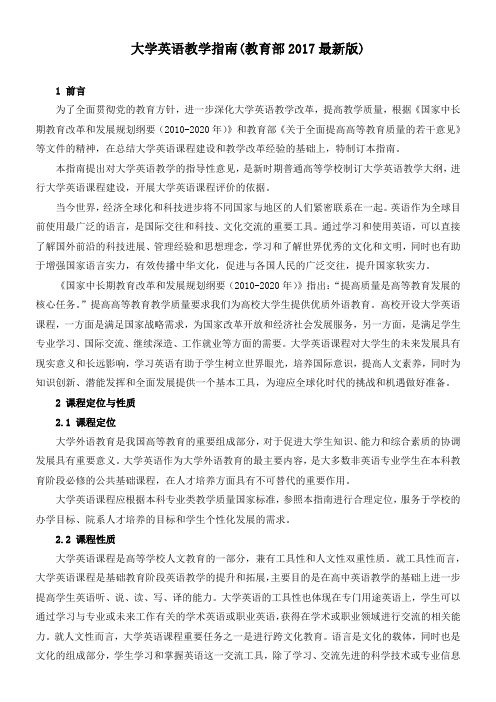
大学英语教学指南(教育部2017最新版)1 前言为了全面贯彻党的教育方针,进一步深化大学英语教学改革,提高教学质量,根据《国家中长期教育改革和发展规划纲要(2010-2020年)》和教育部《关于全面提高高等教育质量的若干意见》等文件的精神,在总结大学英语课程建设和教学改革经验的基础上,特制订本指南。
本指南提出对大学英语教学的指导性意见,是新时期普通高等学校制订大学英语教学大纲,进行大学英语课程建设,开展大学英语课程评价的依据。
当今世界,经济全球化和科技进步将不同国家与地区的人们紧密联系在一起。
英语作为全球目前使用最广泛的语言,是国际交往和科技、文化交流的重要工具。
通过学习和使用英语,可以直接了解国外前沿的科技进展、管理经验和思想理念,学习和了解世界优秀的文化和文明,同时也有助于增强国家语言实力,有效传播中华文化,促进与各国人民的广泛交往,提升国家软实力。
《国家中长期教育改革和发展规划纲要(2010-2020年)》指出:“提高质量是高等教育发展的核心任务。
”提高高等教育教学质量要求我们为高校大学生提供优质外语教育。
高校开设大学英语课程,一方面是满足国家战略需求,为国家改革开放和经济社会发展服务,另一方面,是满足学生专业学习、国际交流、继续深造、工作就业等方面的需要。
大学英语课程对大学生的未来发展具有现实意义和长远影响,学习英语有助于学生树立世界眼光,培养国际意识,提高人文素养,同时为知识创新、潜能发挥和全面发展提供一个基本工具,为迎应全球化时代的挑战和机遇做好准备。
2 课程定位与性质2.1 课程定位大学外语教育是我国高等教育的重要组成部分,对于促进大学生知识、能力和综合素质的协调发展具有重要意义。
大学英语作为大学外语教育的最主要内容,是大多数非英语专业学生在本科教育阶段必修的公共基础课程,在人才培养方面具有不可替代的重要作用。
大学英语课程应根据本科专业类教学质量国家标准,参照本指南进行合理定位,服务于学校的办学目标、院系人才培养的目标和学生个性化发展的需求。
大学英语教学的指南(教育部最新版)
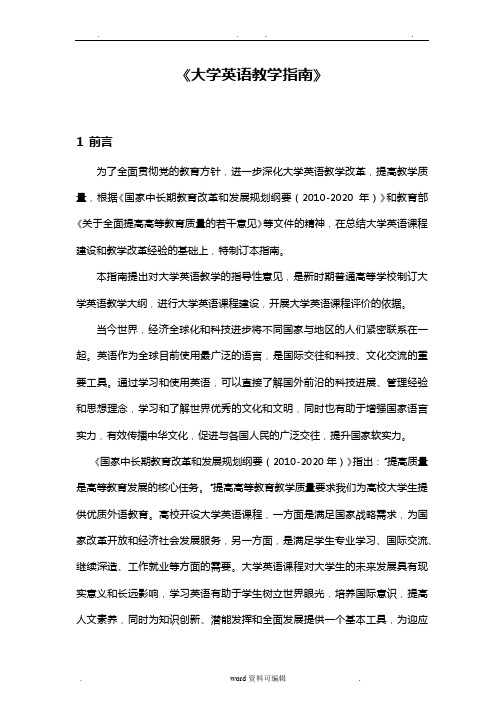
《大学英语教学指南》1 前言为了全面贯彻党的教育方针,进一步深化大学英语教学改革,提高教学质量,根据《国家中长期教育改革和发展规划纲要(2010-2020年)》和教育部《关于全面提高高等教育质量的若干意见》等文件的精神,在总结大学英语课程建设和教学改革经验的基础上,特制订本指南。
本指南提出对大学英语教学的指导性意见,是新时期普通高等学校制订大学英语教学大纲,进行大学英语课程建设,开展大学英语课程评价的依据。
当今世界,经济全球化和科技进步将不同国家与地区的人们紧密联系在一起。
英语作为全球目前使用最广泛的语言,是国际交往和科技、文化交流的重要工具。
通过学习和使用英语,可以直接了解国外前沿的科技进展、管理经验和思想理念,学习和了解世界优秀的文化和文明,同时也有助于增强国家语言实力,有效传播中华文化,促进与各国人民的广泛交往,提升国家软实力。
《国家中长期教育改革和发展规划纲要(2010-2020年)》指出:“提高质量是高等教育发展的核心任务。
”提高高等教育教学质量要求我们为高校大学生提供优质外语教育。
高校开设大学英语课程,一方面是满足国家战略需求,为国家改革开放和经济社会发展服务,另一方面,是满足学生专业学习、国际交流、继续深造、工作就业等方面的需要。
大学英语课程对大学生的未来发展具有现实意义和长远影响,学习英语有助于学生树立世界眼光,培养国际意识,提高人文素养,同时为知识创新、潜能发挥和全面发展提供一个基本工具,为迎应全球化时代的挑战和机遇做好准备。
2 课程定位与性质2.1 课程定位大学外语教育是我国高等教育的重要组成部分,对于促进大学生知识、能力和综合素质的协调发展具有重要意义。
大学英语作为大学外语教育的最主要内容,是大多数非英语专业学生在本科教育阶段必修的公共基础课程,在人才培养方面具有不可替代的重要作用。
大学英语课程应根据本科专业类教学质量国家标准,参照本指南进行合理定位,服务于学校的办学目标、院系人才培养的目标和学生个性化发展的需求。
大学英语教学指南 2022年版
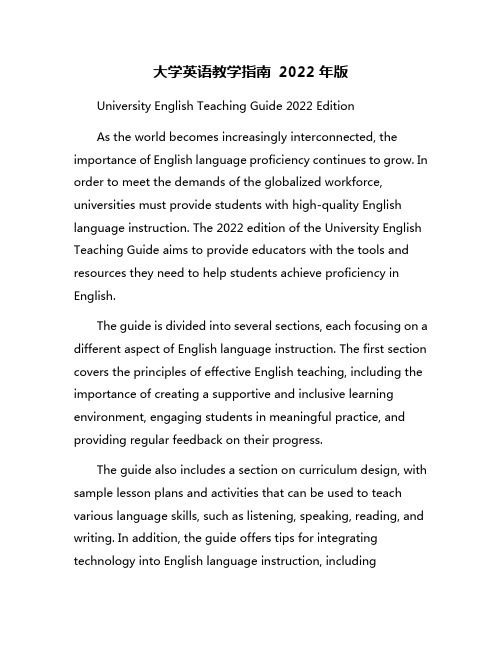
大学英语教学指南2022年版University English Teaching Guide 2022 EditionAs the world becomes increasingly interconnected, the importance of English language proficiency continues to grow. In order to meet the demands of the globalized workforce, universities must provide students with high-quality English language instruction. The 2022 edition of the University English Teaching Guide aims to provide educators with the tools and resources they need to help students achieve proficiency in English.The guide is divided into several sections, each focusing on a different aspect of English language instruction. The first section covers the principles of effective English teaching, including the importance of creating a supportive and inclusive learning environment, engaging students in meaningful practice, and providing regular feedback on their progress.The guide also includes a section on curriculum design, with sample lesson plans and activities that can be used to teach various language skills, such as listening, speaking, reading, and writing. In addition, the guide offers tips for integrating technology into English language instruction, includingrecommendations for online resources, apps, and software that can enhance students' learning experience.One of the key features of the 2022 edition of the University English Teaching Guide is its focus on assessment and evaluation. The guide provides educators with strategies for assessing students' language proficiency, as well as tips for providing feedback that is constructive and actionable. In addition, the guide includes sample rubrics and assessment tools that can be used to measure students' progress over time.Overall, the 2022 edition of the University English Teaching Guide is designed to help educators provide students with the skills and knowledge they need to succeed in an increasingly globalized world. By following the principles and strategies outlined in the guide, educators can create a dynamic and engaging learning environment that fosters students' growth and development in English language proficiency.。
高等学校大学英语教学指南
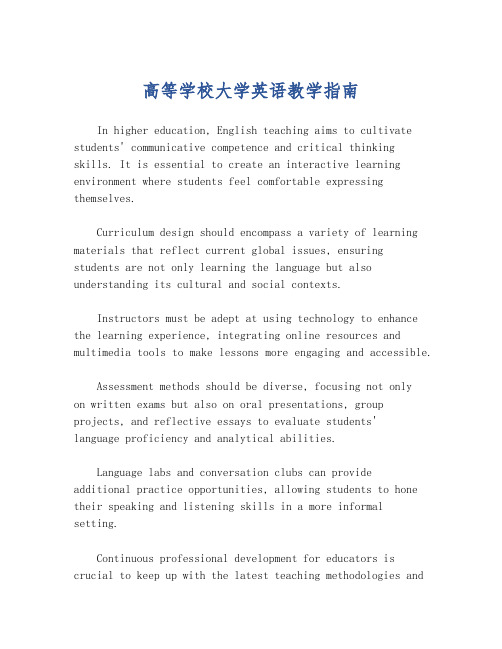
高等学校大学英语教学指南In higher education, English teaching aims to cultivate students' communicative competence and critical thinking skills. It is essential to create an interactive learning environment where students feel comfortable expressing themselves.Curriculum design should encompass a variety of learning materials that reflect current global issues, ensuringstudents are not only learning the language but also understanding its cultural and social contexts.Instructors must be adept at using technology to enhance the learning experience, integrating online resources and multimedia tools to make lessons more engaging and accessible.Assessment methods should be diverse, focusing not onlyon written exams but also on oral presentations, group projects, and reflective essays to evaluate students'language proficiency and analytical abilities.Language labs and conversation clubs can provideadditional practice opportunities, allowing students to hone their speaking and listening skills in a more informal setting.Continuous professional development for educators iscrucial to keep up with the latest teaching methodologies andto adapt to the evolving needs of students.Cultural exchange programs and international collaborations can enrich the learning experience, exposing students to different perspectives and encouraging them to think globally.Feedback should be constructive and timely, helping students to identify their strengths and areas for improvement, and motivating them to take ownership of their learning journey.In conclusion, effective English teaching in higher education requires a holistic approach that addresses language acquisition, cultural awareness, and personal development, preparing students to thrive in an increasingly interconnected world.。
- 1、下载文档前请自行甄别文档内容的完整性,平台不提供额外的编辑、内容补充、找答案等附加服务。
- 2、"仅部分预览"的文档,不可在线预览部分如存在完整性等问题,可反馈申请退款(可完整预览的文档不适用该条件!)。
- 3、如文档侵犯您的权益,请联系客服反馈,我们会尽快为您处理(人工客服工作时间:9:00-18:30)。
《大学英语教学指南》
教育部高等学校大学外语教学指导委员会
王守仁
1.前言
2.课程性质与定位
3.教学目标和教学要求
4.课程设置
5.评价与测试
6.教学方法与手段
7.教学资源
8.教学管理
9.教师发展
确立多元教学目标,提供多种选择
1 前言
当今世界,经济全球化和科技进步奖不同国家与地区的人们紧密联系在一起。
英语作为全球目前使用最广泛的语言,是国际交往和科技、文化交流的重要工具。
通过学习和使用英语,可以直接了解国外前沿的科技进展、碗里经验和思想理念,学习和了解世界优秀的文化和文明,同时也有助于增强国家语言实力,有效传播中华文化,促进与各国人民的广泛交往,提升国家软实力。
高校开设大学英语课程,一方面是满足国家战略需求,为国家级改革开放和经济社会发展服务,另一方面,是满足学生专业学习、国际交流、继续深造、工作就业等方面的需要。
大学英语课程对大学生的未来发展具有现实意义和长远影响,学习英语有助于学生树立世界眼光,培养国际意识,培养人文素养,同时为知识创新、潜能发挥和全面发展提供一个基本工具,为迎应全球化时代的挑战和机遇做好准备。
3教学目标和教学要求
大学英语的教学目标是培养学生的英语应用能力,增强跨文化交际意识和交
际能力,同时发展自主学习能力,提高综合文化素养,是他们在学习、生活、社会交往和未来工作中能够有效地使用英语,满足国家、社会、学校和个人发展的需要。
基础目标提高目标发展目标
大学英语根据三级教学目标目标提出三个级别的教学要求。
基础目标的教学要求主要针对英语高考成绩合格的学生,是大部分学生本科毕业时应达到的基本要求。
提高目标和发展目标的教学要求分别针对大学入学时应予以达到较好水平的学生,也是对学生英语应用能力要求较高的专业所选择的要求。
对英语高考成绩基本合格的学生学校可适当调整基础目标的部分教学要求。
基础目标
能够基本满足日常生活、学习和未来工作中与自身密切相关的信息交流的需要;能够基本正确地运用英语语言、智慧、语法及篇章结构等语言知识,在高中阶段应掌握的词汇基础上增加约2000个单词,其中四百个单词为与专业学习与未来工作相关的词汇;能够基本理解语言难度中等、设计常见的个人和社会交流题材的口头或书面材料;能够就熟悉的主题或话题进行简单的口头和书面交流;能够借助网络资源、工具书或他人的帮助,对中等语言难度的信息进行处理和加工,理解主旨思想和重要细节,表达基本打一份好能够使用有限的学习策略;在与来自不同文化的人交流时,能够观察到彼此之间的文化和价值观差异,并能根据交际需求运用有限的交际策略。
3教学目标和教学要求
上述三个级别的教学目标和教学要求是个高校在制定本校大学英语教学大纲和其他教学文件时的参照基准。
各高校可以根据本校实际情况对具体要求与指标做适当的调整。
在提倡学生语言技能平衡发展的同时,也鼓励不同学校、不同院系我不同学科的大学英语教学可以在语言技能的选择上有所侧重,突出特色,以满足院系和学生的不同需求。
4课程设置
课程设置是教学目标在学校课程计划中的集中表现,是对课程结构和课程内容所做的安排和规定。
但是英语教学的主要内容可分为通用英语、专门用途英语和跨文化交际三个部分,由此形成相应的三大类课程。
大学英语课程有必修课、限定选修课和任意选修课组成。
各高校应根据学校类型、层次、生源、办学定位、人才培养目标等,遵循语言教学和学习规律,合理安排相应的教学内容和可是,形成反映本校特色、动态开放、科学合理的大学英语课程体系。
专门用途英语课程将特定的学科内容语言教学目标相结合,教学活动着重解决学生学科知识学习过程中所以到的语言问题,以培养学生与专业相关的英语能力为教学重点。
专门用途英语课程凸显大学英语工具性特征。
各高校英语需求分析为基础根据学校人才培养规格和学生需要开设体现学校特色的专门用途英语课程,供学生选择;也可在通用英语体系内,纳入通用学术英语和职业英语等内容。
基础级别的通用英语课程以高中英语选修1课程为起点,重点突出听、说、读、写、译基本技能的培养和语言基础知识的学习。
通过一至一年半的英语教学,使学生英语能力达到本指南规定的大学英语教学基础目标的相关要求。
提高级别的通用英语课程强调听、说、读、写、译技能的进一步提升,兼顾语法、智慧、天章、语用等语言知识的进一步巩固、提高和相关知识的进一步扩充。
通过一年左右的英语教学,使学生英语能力达到本指南规定的大学英语教学提高目标的相关要求。
各高校应根据学校类型、城市、生源、办学定位、人才培养目标等,遵循语言教学和学习规律,合理安排相应的教学内容和课时,形成反映本校特色、动态开放、科学合理的大学英语课程体系。
6 教学方法一手段
现代信息技术应用于大学英语教学,不仅是教学手段实现了现代化、多样化和便捷化,伊宁市教学理念、教学内容、教学方式发生改变。
信息化时代为外语教学提供了全新的学习方式和前所未有的丰富资源。
因此,大学英语应大力推进最新信息技术与课程教学的融合,继续发挥现代教育技术,特别是信息技术在外语教学中的重要作用。
大学英语教师要以时俱进,跟上新技术发展,不断提高使用信息技术的意识、知识和能力,在具体的课堂教学设计与实施过程中,融入并合理使用信息技术元素。
各高校应充分利用信息技术积极创建多元的教学与学习环境。
鼓励教师建设和使用微课、慕课,利用网上优质教学资源改造和拓展教学内容,实施基于课堂、在线网上课程的翻转课堂等混合式教学模式,使学生朝着主动学习、自主学习和个性化学习的方向发展。
通过建立网上交互学习平台,我是上提供涵盖教学设计、课堂互动、教学辅导、学生练习、作业反馈、学习评估等环节的完整教学体系。
教学体系应具有人机交互、人人交互功能,已先期你操作性、克移动性和监控行等特性,允许学生随时随地选择适合自己水平和需求的材料进行学习,能记录和检测学生的学习过程,并及时提供反馈信息。
7教学资源
教材是教学内容的主要载体,也是实现教学目标的基本保证。
大学英语教材的编写指导思想、审查内容、设计体力和载体形式要做到与时俱进,充分体现高等教育的特点。
大学英语教学应选用国家及规范教材及其他优秀教材,积极推进大学英语立体化教材建设。
但高校也应重视教学参考资料的选择或编写,尤其要在现代丰富的网络资源中,适用于各种相关的优质教学资源。
教学参考资料的选用应注重只思想性、权威性和相关性,兼顾拓展性和多媒体信。
中国教育学会会长钟秉林说到:“高校入学考试形式、内容以及招生录取机制的改革,将是未来的高校生源发生新的变化,必然对高校人才培养和教学工
作带来深刻影响。
我认为高小首先要研究新生知识结构和能力素质结构的变化情况,根据自身的目标定位和社会需求,探索构建多样化的人才培养模式。
比如研究型院校要探索爱学科门类、专业大类我专业群培养人才的宽口径模式;应用技术行远想和高职高专院校要加强产学合作和惨叫融合,探索面向行业和就业市场需求的人才培养模式。
其次高校要结合专业特色和社会需求,平衡好通识教育与专业教育、理论教学与实践教学、宽口径培养与职业能力养成的关系。
”
在我国,外语教育不是要虚弱,而是应该加强。
《深化考试招生制度改革,加强国家外语能力测评体系建设》中国考试2015年第一期林蕙青
开放也是改革,我们要以开放的主动,赢得发展的主动、国际竞争的主动,通过开放版中国的教育办得更好。
开放式我的时代最鲜明的特征,也是社会主义大学的鲜明特征。
----教育部部长袁贵仁与政协教育界别委员
一起把脉“今天的事业”共话“明天的望” 20150308。
